March 2025
The global digital health in neurology market size accounted for USD 39.82 billion in 2024, grew to USD 48.78 billion in 2025 and is expected to be worth around USD 303.23 billion by 2034, registering a healthy CAGR of 22.51% between 2024 and 2034. The North America digital health in neurology market size is evaluated at USD 15.13 billion in 2024 and is estimated to grow at a CAGR of 22.65% during the forecast period.
The global digital health in neurology market size is calculated at USD 39.82 billion in 2024 and is predicted to surpass around USD 303.23 billion by 2034, expanding at a CAGR of 22.51% from 2024 to 2034. The digital health in neurology market is driven by the expanding remote patient monitoring (RPM) for long-term neurological disorders.
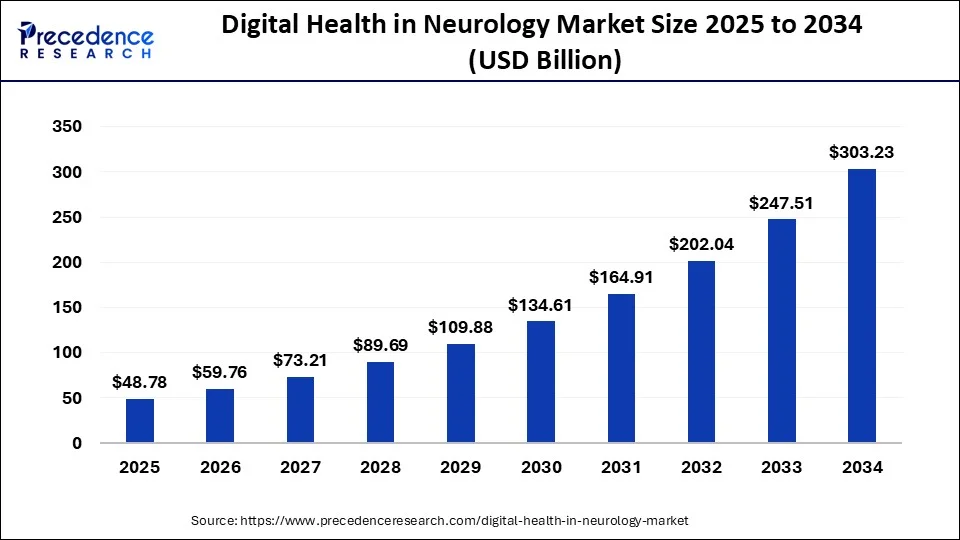
The U.S. digital health in neurology market size is exhibited at USD 13.32 billion in 2024 and is projected to be worth around USD 103.32 billion by 2034, growing at a CAGR of 22.71% from 2024 to 2034.
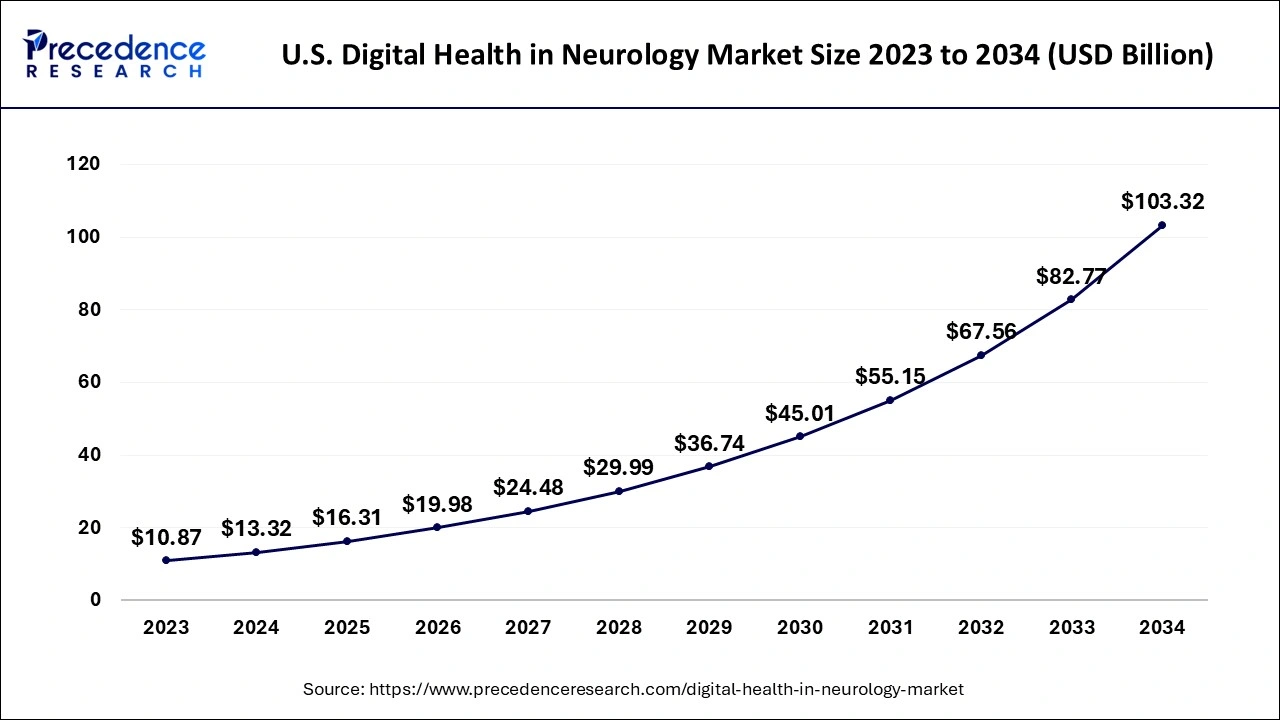
North America dominated the digital health in neurology market in 2023. Some of the world's most innovative technology businesses and research institutes are in North America, particularly in the United States. This technological leadership is evident in healthcare, especially in digital health. Digital neurology is advancing rapidly due to the extensive use of artificial intelligence, machine learning, and big data analytics by companies like IBM Watson Health, Google Health, and other corporate behemoths. The FDA's Digital Health Innovation Action Plan has expedited the approval process for these solutions and provided businesses with a well-defined regulatory framework.
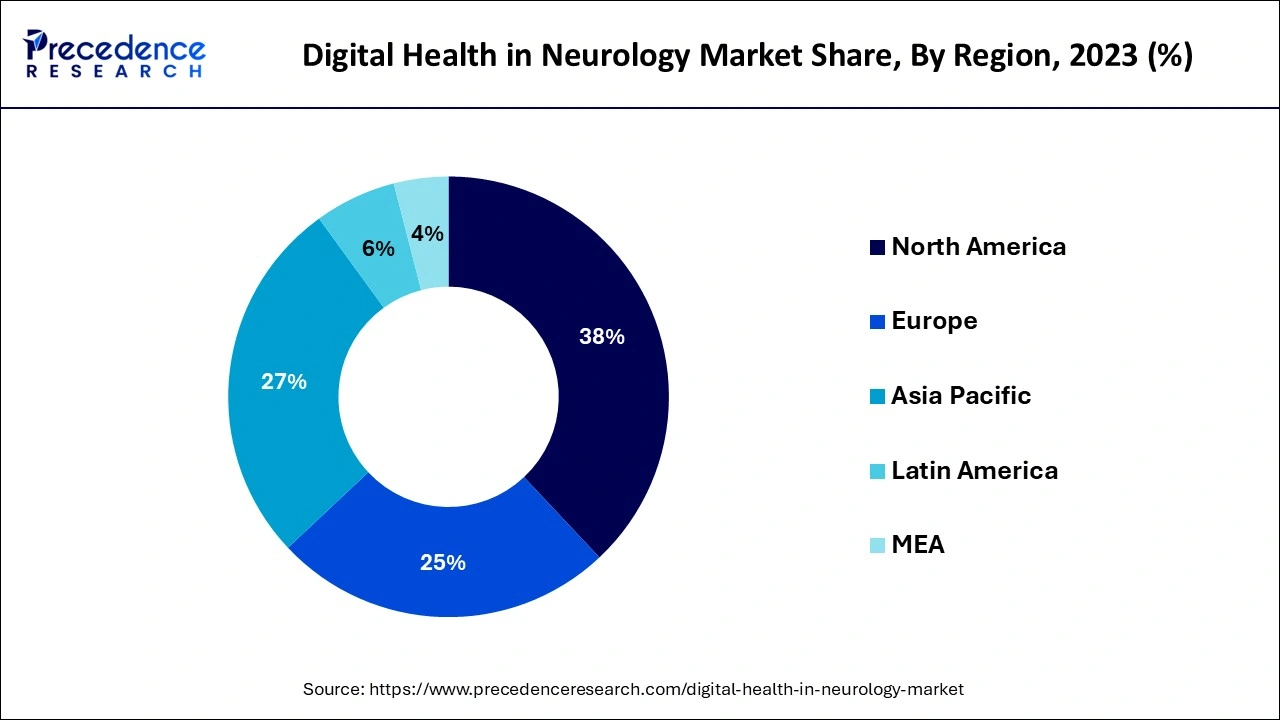
Asia Pacific is observed to host the fastest-growing digital health in neurology market during the forecast period. The digital health ecosystem in Asia-Pacific is flourishing and is driven by startups, innovation hubs, and partnerships between tech firms and healthcare providers. AI-driven instruments and neurological monitoring apps that support early diagnosis and therapy are being developed by digital health startups in Singapore, India, and Australia. Governments have implemented laws to safeguard patient information, which has increased trust in and uptake of digital health platforms for neurological treatment.
A variety of digital technologies have already been used to treat several distinct neurological disorders, including Parkinson's disease, acquired brain injury, epilepsy, and headaches and migraines. There is evidence that web-based platforms may positively impact mental health and quality of life, and there seems to be use and interest in them, at least in the near term.
How Does Artificial Intelligence (AI) Help the Digital Health in Neurology Market?
Artificial intelligence has recently brought about a significant revolution in the digital health in neurology market. These developments have transformed our knowledge of and ability to diagnose and ability to treat neurological illnesses. Artificial intelligence is significantly advancing neurology through its capacity to scan large volumes of data and spot complex patterns. Applications in neurology include early disease identification and individualized treatment plans. Making computer algorithms that replicate cognitive abilities like learning, reasoning, and self-correction is the goal of artificial intelligence.
Significant advancements have been made in the digital health in neurology market such as machine-based processing of complicated data for routine clinical applications. Modern healthcare is based on precision medicine, and AI is essential to customizing therapy for each patient. Through the analysis of genetic data, AI systems can identify genetic predispositions and forecast treatment responses.
| Report Coverage | Details |
| Market Size by 2034 | USD 303.23 Billion |
| Market Size in 2024 | USD 39.82 Billion |
| Market Size in 2025 | USD 48.78 Billion |
| Market Growth Rate from 2024 to 2034 | CAGR of 22.51% |
| Largest Market | North America |
| Base Year | 2023 |
| Forecast Period | 2024 to 2034 |
| Segments Covered | Component, End-use, and Regions |
| Regions Covered | North America, Europe, Asia-Pacific, Latin America and Middle East & Africa |
Rising prevalence of neurological disorders
Since neurological conditions are often progressive and persistent, long-term care is necessary. Because of the intricacy of the care and the requirement for ongoing monitoring and treatment modifications, this puts a significant strain on healthcare systems. This expanding patient population may be too much for traditional healthcare institutions to handle, resulting in delayed diagnosis, ineffective therapies, and a rise in hospital admissions. Consequently, digital health in neurology market services such as telemedicine, AI-driven diagnostics, and remote monitoring tools have become popular and affordable approaches to relieve the burden on healthcare systems in neurology.
Lack of financial incentives
Digital health products emphasizing neurology depend on cutting-edge technology like blockchain, cloud computing, Artificial intelligence, and machine learning. Significant financial resources are needed for both hardware and software development to implement these technologies in the digital health in neurology market. When incorporating digital health platforms into their operations, neurology clinics may have to pay hefty expenses for patient education, new IT systems, and staff training.
Advancements in digital health technologies
Continuous surveillance of people's vitals, activity levels, and even symptoms of neurological illnesses like epilepsy or Parkinson's disease is made possible by technologies like smartwatches and health monitoring devices. Personalized care plans and prompt actions may result from this real-time data. In the digital health in neurology market, apps can make registering symptoms, medication use, and lifestyle factors easier. This gives medical professionals access to detailed data that helps them better customize therapies for patients. Using digital health technologies facilitates distant involvement in clinical trials, hence augmenting patient recruitment and retention. Faster and more varied clinical research on neurological disorders may result from this.
The services segment dominated the global digital health in neurology market in 2023. Neurology is a complex field that requires specialist care. Patients with neurological conditions like Parkinson's disease and Alzheimer's require constant monitoring, precise diagnosis, and individualized treatment regimens. With the growing prevalence of neurological diseases throughout the world, these services offer an environment for tracking, remote consultations, and therapy interventions, all highly sought-after services. By making the most use of the resources at hand, these neurological services reduce healthcare expenses. Remote services such telemedicine save both time and cash for patients and medical personnel by eliminating the need for in-person hospital visits. Additionally, by spotting anomalies before they get worse and become more serious health problems, early detection services and continuous monitoring can help avoid hospital readmissions.
The software segment is observed to grow at the fastest rate in the digital health in neurology market during the forecast period. Neurology software solutions that enable virtual care have gained popularity due to an increase in the demand for telehealth and remote patient monitoring, particularly during the COVID-19 epidemic. In neurology, big data analytics is revolutionizing patient-specific treatment planning. By combining patient data from multiple sources, such as brain scans, genetic data, and sensor information, the program brings predictive models to identify the best course of treatment for each patient.
The patients segment held the largest share of the digital health in neurology market in 2023. The global healthcare sector is witnessing a growing trend toward patient-centric treatment. As a result, the neurology digital health market has changed to provide services that directly address patients' wants and preferences. Patients with neurological illnesses often want tools that offer convenience, accessibility, and a sense of control over their health, as these conditions frequently cause considerable disturbances to their lifestyle.
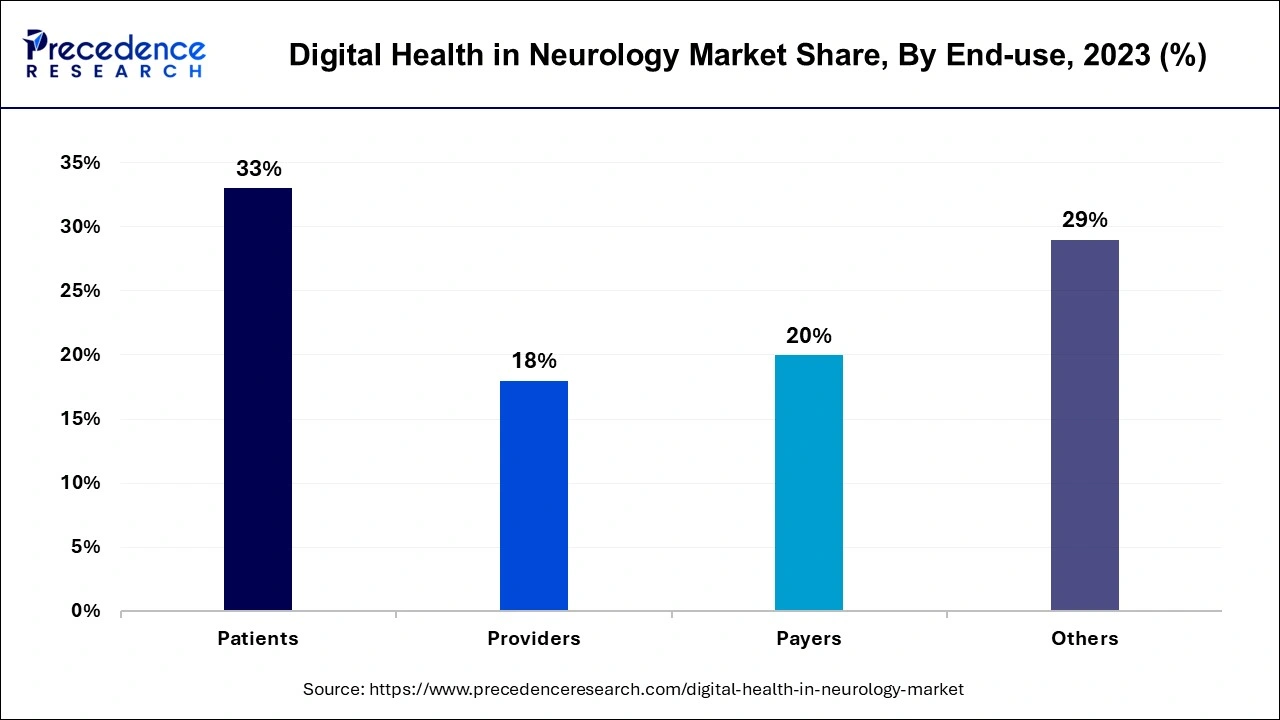
The provider's segment is observed to grow rapidly in the digital health in neurology market during the forecast period. Providers use digital health platforms to provide more individualized care, which has been shown to enhance patient outcomes for neurological conditions. Providers can tailor treatment strategies for individual patients by leveraging real-time data from monitoring devices, medical history, and genetic data by employing big data analytics. By evaluating brain imaging data, for instance, AI systems can assist neurologists in identifying early indicators of neurodegenerative disorders like Alzheimer's. The capacity to diagnose patients more quickly and accurately encourages doctors to use AI-powered solutions.
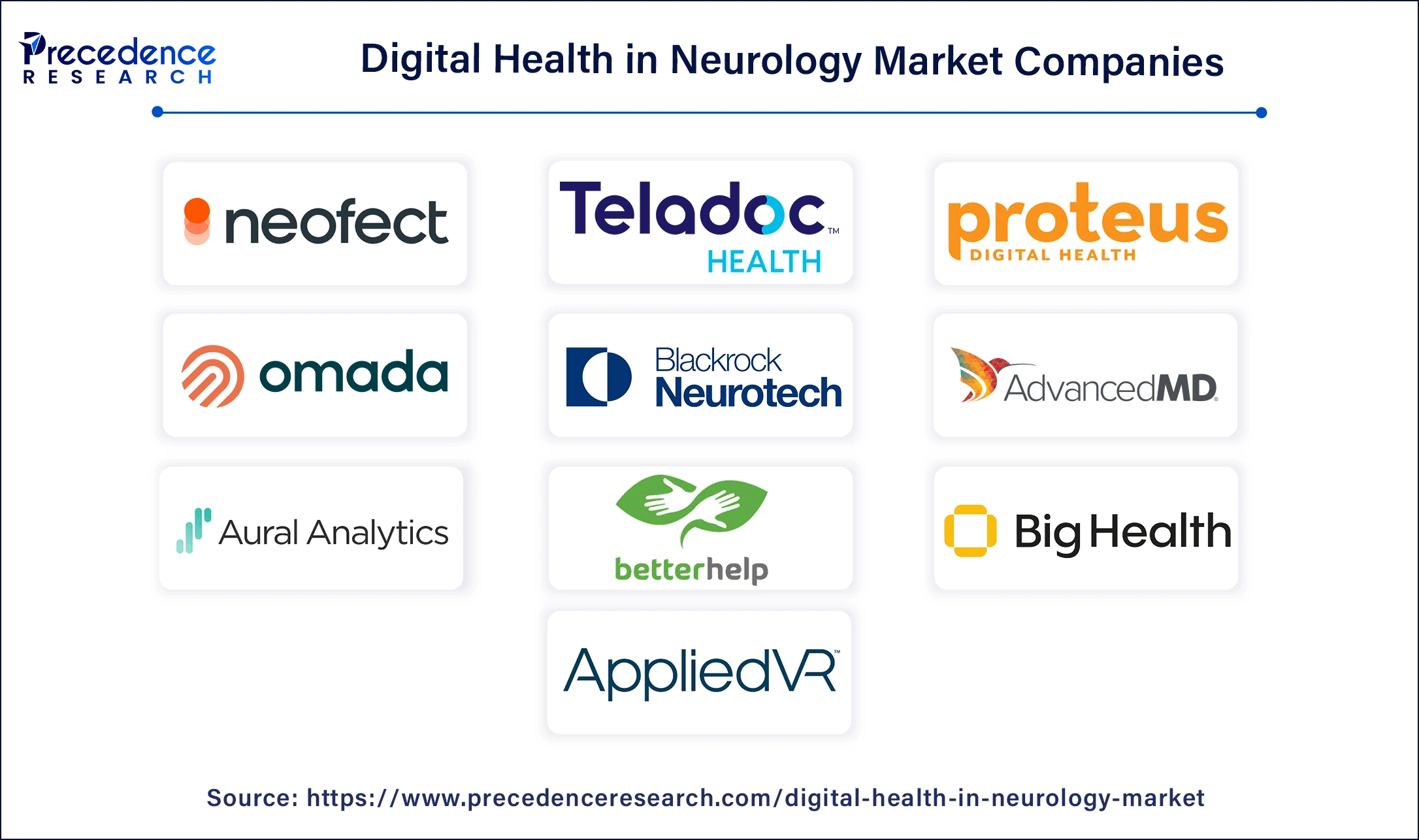
Segments Covered in the Report
By Component
By End-use
By Geography
For inquiries regarding discounts, bulk purchases, or customization requests, please contact us at sales@precedenceresearch.com
No cookie-cutter, only authentic analysis – take the 1st step to become a Precedence Research client
March 2025
January 2025
January 2025
August 2024